Learn about George Boole through our interactive timeline of his life events.

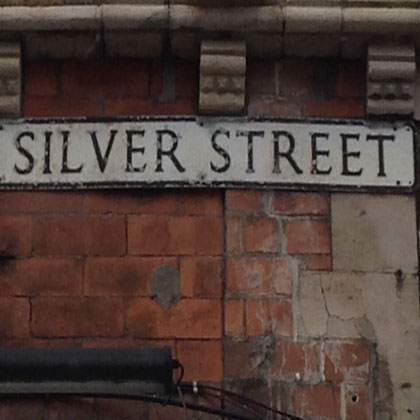
George Boole is born on 2 November 1815 in Lincoln, England; he is the first child of John Boole, a shoemaker, and his wife Mary Ann, who was a lady’s maid. Read more
George Boole is born on 2 November 1815 in Lincoln, England; he is the first child of John Boole, a shoemaker, and his wife Mary Ann, who was a lady’s maid.
John Boole’s boot and shoe shop in Silver Street provides an income, but the family’s economic and social position is humble.
Augustus de Morgan, University College London
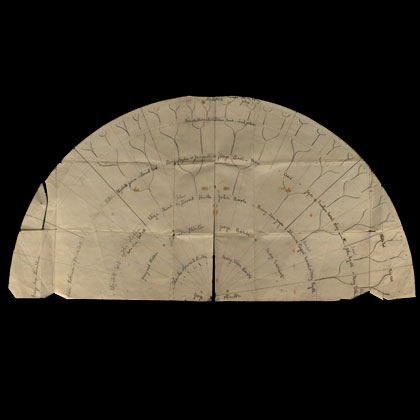
George's sister Mary Ann is born in 1818; his brothers William in 1819 and Charles in 1821.Read more
George's sister Mary Ann is born in 1818; his brothers William in 1819 and Charles in 1821.

John Boole is passionately interested in science; he becomes George’s first teacher in mathematics and encourages his son’s academic progress. Read more
John Boole is passionately interested in science; he becomes George’s first teacher in mathematics and encourages his son’s academic progress.
Father and son together apply mathematics to building cameras, microscopes and telescopes.
George Boole goes to a commercial school for the sons of business people, the best schooling his family can afford. George's appetite for learning outpaces his teachers, and his father arranges extra tuition in Latin.
Fellow primary school pupil
Having mastered Latin, George teaches himself classical Greek.
Aged 14, he translates a Greek poem Ode to the Spring which is published locally. George presses on to teach himself French, German, and later Italian.
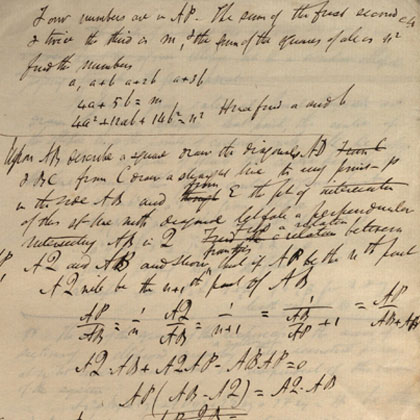
In 1831, Boole begins an ambitious programme of self-education in mathematics. Read more
In 1831, Boole begins an ambitious programme of self-education in mathematics.
He reads in French advanced mathematical texts by Lacroix, Lagrange, and Laplace. He studies and masters Sir Isaac Newton's great work Principia Mathematica.
His father's struggling shoemaker's business collapses.
Aged 16, George must provide for his family. Abandoning thoughts of a church career, he becomes an assistant teacher.
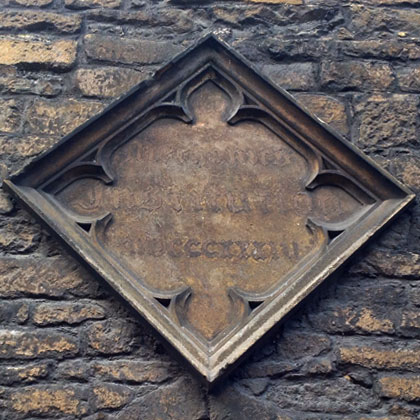
Boole becomes active in this Lincoln forerunner of an adult education institute.Read more
Boole becomes active in this Lincoln forerunner of an adult education institute.
He is selected to be superintendent of classes and, for many years, provides free teaching in mathematics, science and the classics.
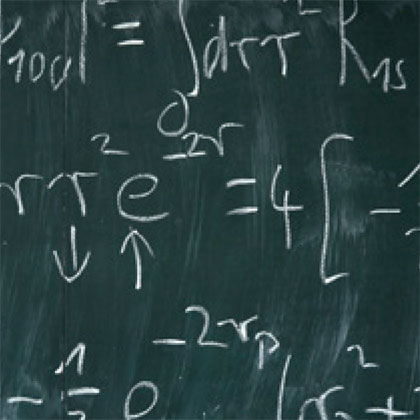
George delivers an address on the Genius and Discoveries of Sir Isaac Newton.Read more
George delivers an address on the Genius and Discoveries of Sir Isaac Newton.
The large audience is drawn from the Mechanics' Institute and leading citizens. Later this year, his lecture is printed and sold in Lincoln, and copies reach London.
Boole in his Newton lecture
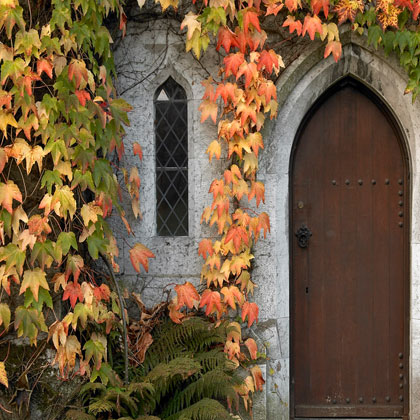
Boole's studies are encouraged by the mathematician Sir Edward ffrench Bromhead FRS, first President of the Mechanics' Institute from 1833.Read more
Boole's studies are encouraged by the mathematician Sir Edward ffrench Bromhead FRS, first President of the Mechanics' Institute from 1833.
Bromhead has a fine library at Thurlby Hall near Lincoln; he encourages Boole to borrow advanced mathematical texts and he comments on Boole's researches.
Boole to Sir Edward ffrench Bromhead, 1839
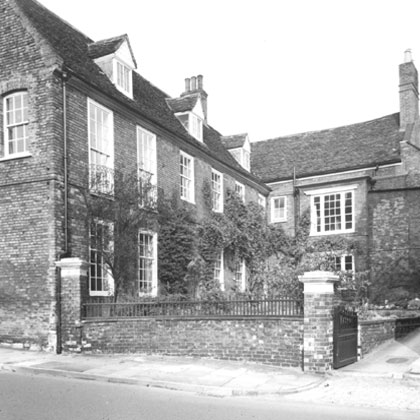
Boole recognises that, to secure the family finances, he must own his own school.Read more
Boole recognises that, to secure the family finances, he must own his own school.
He opens a 'Boarding School for Young Gentlemen' at Potter's Gate, Lincoln; his family assist with teaching and administration.
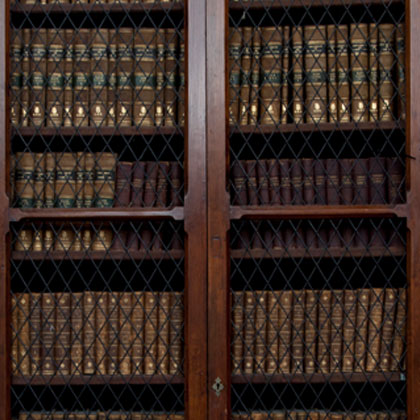
Boole publishes his first paper Researches on the Theory of Analytical Transformations in the Cambridge Mathematical Journal.Read more
Boole publishes his first paper Researches on the Theory of Analytical Transformations in the Cambridge Mathematical Journal.
Later this year, his paper Exposition of a General Theory of Linear Transformations initiates a new branch of mathematics, now called Invariant Theory. Boole contributes a total of 24 papers to the Cambridge Journal.
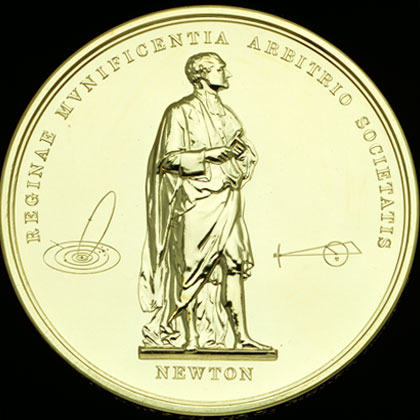
Boole's major paper On a General Method of Analysis is published in the Royal Society's Philosophical Transactions.Read more
Boole's major paper On a General Method of Analysis is published in the Royal Society's Philosophical Transactions.
In his paper, Boole introduces his new 'algebra of classes'.
Boole is awarded the Royal Society's Royal Medal for Mathematics for this paper.
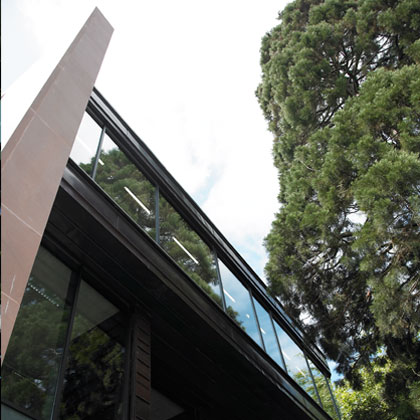
Boole delivers his paper On the Equation of Laplace's Functions to the Annual Meeting of the British Association for the Advancement of Science in Cambridge. Read more
Boole delivers his paper On the Equation of Laplace's Functions to the Annual Meeting of the British Association for the Advancement of Science in Cambridge.
Testimonial by Augustus de Morgan, 1846
Boole's first book A Mathematical Analysis of Logic breaks new ground.
He demonstrates that a mathematical approach can be applied to logic.
He introduces 'symbolic logic' where mathematical symbols are used to represent classes or sets of objects, and the symbols are manipulated through mathematics.
George Boole, preface to A Mathematical Analysis of Logic
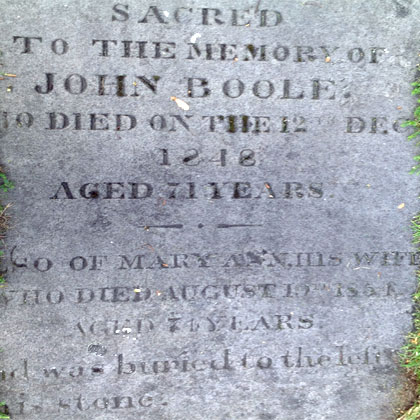
Boole's problematic but remarkable father, born 1777, dies in December after a long illness.Read more
Boole's problematic but remarkable father, born 1777, dies in December after a long illness.
Mary Ann Boole (George Boole's mother)
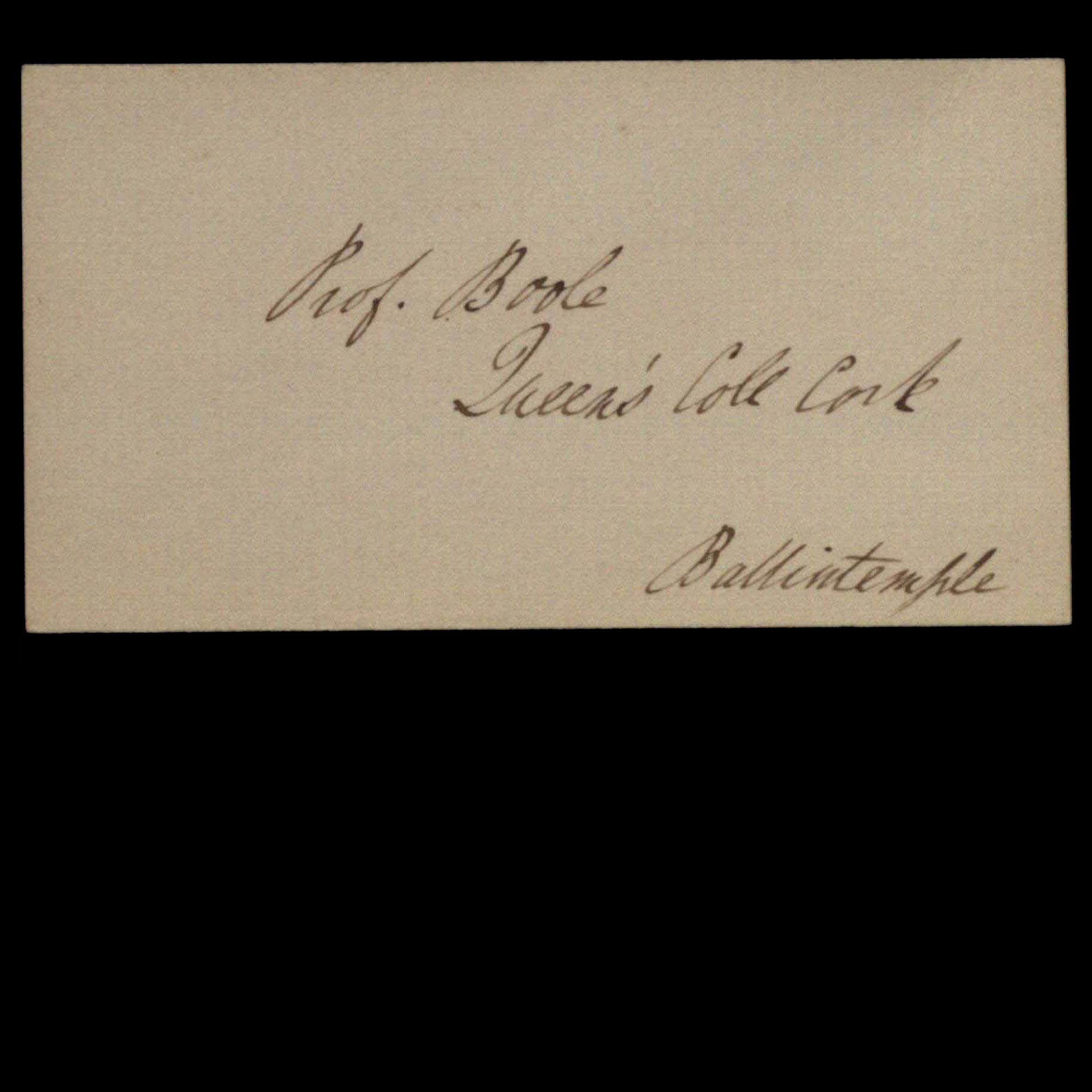
With testimonials from leading mathematicians, Boole applies for a Professorshop..Read more
With testimonials from leading mathematicians, Boole applies for a Professorshop..
With testimonials from leading mathematicians, Boole applies for a Professorshop at one of the three new Queen's Colleges in Ireland in 1846. After a long delay, due partly to the Great Famine, he is appointed the first Professor of Mathematics at Queen's College Cork.
Boole's appointment gives him a new sense of freedom and financial security. He becomes an accomplished lecturer, and continues researching symbolic logic.
He occupies pleasant lodgings at 5 Grenville Place, overlooking the River Lee.
Advertisement for Boole's Boarding School, 1849
Boole to William Thompson (later Lord Kelvin), 1850

Boole is elected Dean of the Science Division of the Faculty of Arts for 1851-2. A conscientious committee man, he is re-elected for a second term.Read more
Boole is elected Dean of the Science Division of the Faculty of Arts for 1851-2. A conscientious committee man, he is re-elected for a second term.
Boole publishes An Investigation of the Laws of Thought.
This magnum opus extends his exploration of symbolic logic to probability theory, and originates a new concept, Mathematical Probability. The Laws of Thought builds upon and expands Boole's 1847 Analysis of Logic.
In 1859, while continuing to explore probability, logic and operator theory, Boole is drawn back to his first love, differential calculus. He produces an excellent textbook A Treatise on Differential Equations; still in print, it remains useful for students today.
In 1860, Boole reassesses his work on calculus and writes an outstanding textbook A Treatise on the Calculus of Finite Differences. Exploring difference equations, Boole forsees correctly that discrete mathematics will grow increasingly in importance.
Garrett Birkhoff, 1955
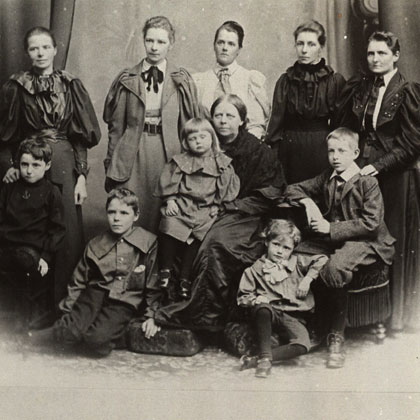
Mary is the niece of John Ryall, Vice-President and Professor of Greek at Queen's College Cork; her paternal uncle Sir George Everest is Surveyor-General of India, and gave his name to the world's highest mountain.Read more
Mary is the niece of John Ryall, Vice-President and Professor of Greek at Queen's College Cork; her paternal uncle Sir George Everest is Surveyor-General of India, and gave his name to the world's highest mountain.
George and Mary first meet in 1850, when Mary is aged 18; from 1852 George gives her informal lessons in mathematics, and they write to one another. At the time of their marriage, George is aged 40 and Mary 23; despite the age difference, they are closely united and their marriage is happy.
George and Mary go on to have five daughters; Mary Ellen, in 1856, Margaret in 1858, Alicia in 1860, Lucy in 1862, and Ethel Lillian in 1863.
In adult life, each of their five daughters proves exceptionally gifted.
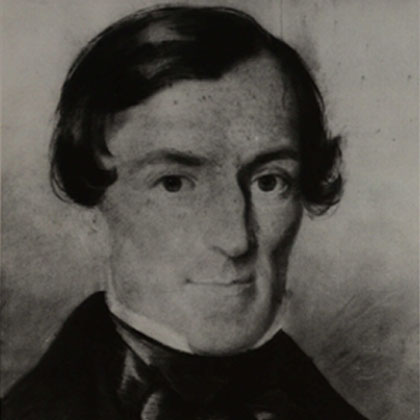
Boole is elected a Fellow of the Royal Society in London, confirming his reputation as one of the leading mathematicians of his time.Read more
Boole is elected a Fellow of the Royal Society in London, confirming his reputation as one of the leading mathematicians of his time.
Among the distinguished names supporting his admission are Kelland, Kelvin, Tyndall, Graves, Cayley, and the geologist Joseph Jukes who proposes him.
Professor Phillip Kelland, 1844
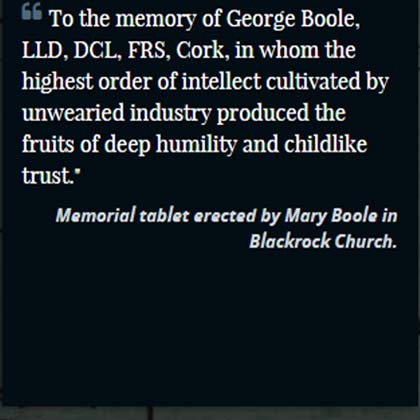
George Boole dies tragically early, aged 49, on 8 December 1864.Read more
George Boole dies tragically early, aged 49, on 8 December 1864.
He falls victim to pneumonia, having been soaked in a rainstorm while walking to college and teaching in damp clothes. He is buried in the churchyard of St. Michael's Church of Ireland church at Blackrock, County Cork.
George Boole's sudden death and the loss of his salary put Mary Boole under great financial stress; she decides to return to England. Applying to Lord Palmerston, she is awarded a modest pension of £100 per annum. Mary Boole continues to research and write until her death in 1916, on subjects including medicine, mathematics, psychology and education.